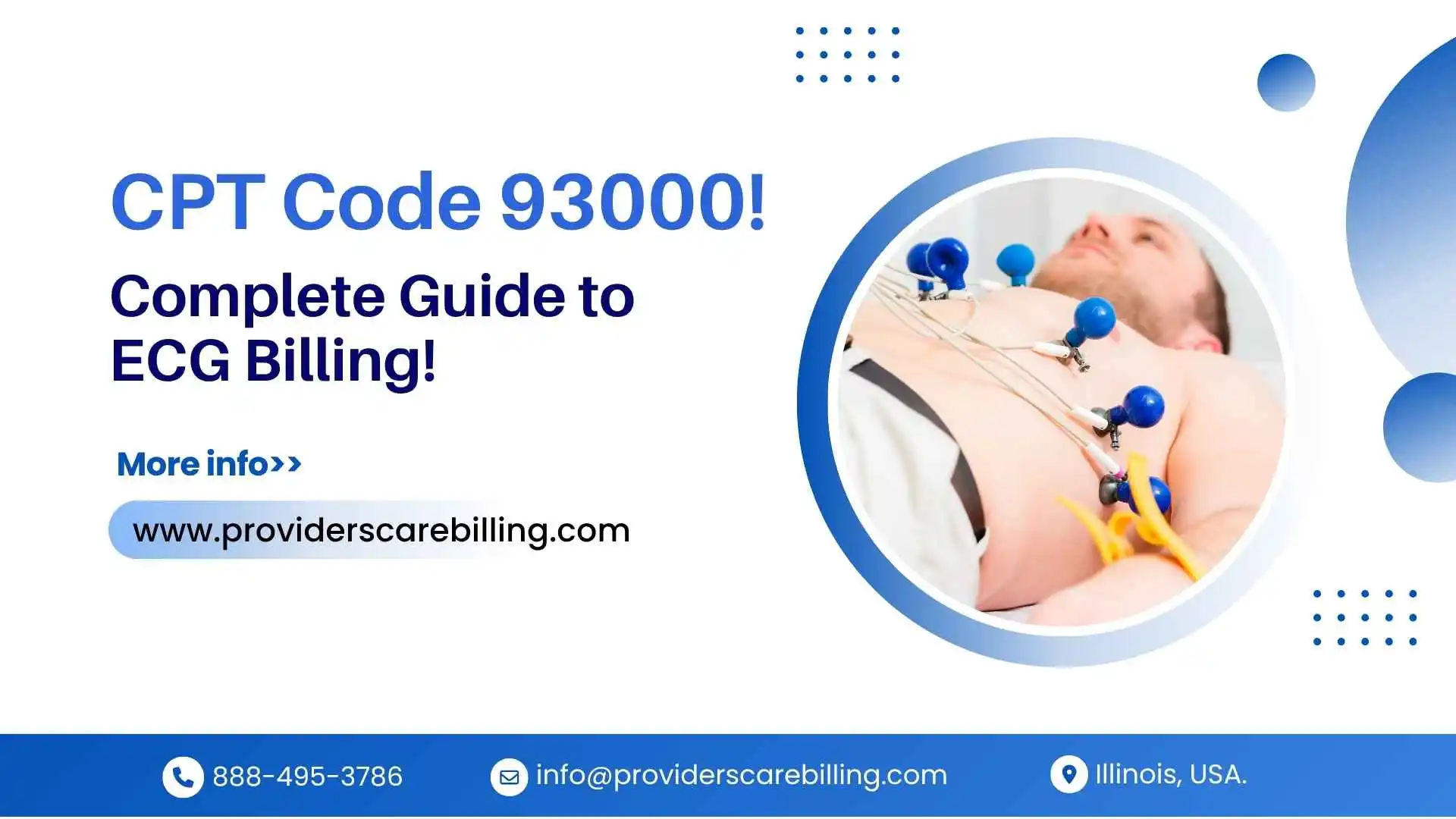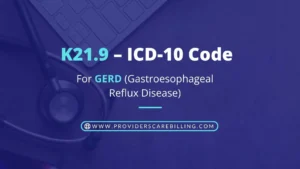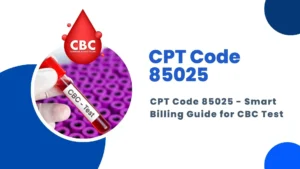An electrocardiogram (ECG) or EKG is a popular heart that determines issues with the heart’s electrical activity. Doctors use them in the diagnosis of chest pain, irregular heartbeat, dizziness, and more. Like other diseases, cardiac diseases also have related CPT codes.
For medical billing, knowing the right CPT codes and rules is important to get paid properly. CPT code 93000 is one of the most common with ECGs. In this guide, we will describe all the details in the simplest words so that you can know how the ECG billing can be used, particularly the 93000 CPT code.
What is CPT Code 93000?
The 93000 CPT code description is “Electrocardiogram, routine ECG with at least 12 leads; with interpretation and report.” This implies that the ECG test should have 12 leads, and the doctor is expected to analyse the results and provide a report.
It includes both technical (using the ECG machine) and professional (an interpretation by the doctor) parts. It is especially for patients who have any heart-related symptoms and needs a quick, in-office heart check.
What is an Electrocardiogram (ECG)?
An electrocardiogram (CPT or ECG) is a non-complex test that requires a few minutes. The electrical signals of the heart are recorded using electrodes attached to the chest, arms, and legs of the patient. This assists the physicians in observing patterns and detecting any issues concerning the heartbeat.
It is an easy and noninvasive test. Many doctors’ offices, clinics, and emergency rooms use it for heart check-ups.
Different Codes for ECG
In the case of ECG billing, it is better to choose the appropriate code. Two other related ECG codes exist besides 93000
- Procedure code 93005: This only applies to the technical aspect, i.e., recording the ECG only, not interpreting.
- CPT 93010: This is the code of interpretation and report only, where the ECG is performed in a different place.
If you are recording and interpreting simultaneously, you should use 93000. If you are only interpreting the patient’s ECG, you should apply 93010. If you are just performing the test or recording, use the 93005 CPT code.
ICD and Diagnosis Code for ECG Billing
When you charge an ECG, you should have a diagnosis or dx code for EKG to support the reason the test is performed. This is the ICD-10 code.
Common ICDs for 93000 are:
- R07.9 – Chest pain, unspecified
- I48.91 – Unspecified atrial fibrillation
- R00.2 – Palpitations
- I10 – Essential hypertension
Make sure that the diagnosis code justifies medical necessity. That is, the medical justification for conducting the ECG should be logical to the insurance providers.
CPT Code for Treadmill Stress Test
A treadmill stress test is different from a regular ECG. It is used to monitor how the heart reacts to stressful conditions like exercise. The CPT code treadmill stress test is usually 93015, which includes the test, supervision, and interpretation. If the components are done separately, you may use
- 93016 for supervision only
- 93017 for tracing only
- 93018 for interpretation and report only
It is important not to mix up a stress ECG with a typical 12-lead ECG (93000). Now, let us know about CPT code 12 Lead ECG.
CPT Code 12 Lead ECG
A 12-lead ECG shows a complete image of the heart’s work. The 12-lead ECG CPT code is again 93000 when you do the test and interpretation. With a single component done, it will be 93005 or 93010, as indicated above. Twelve leads refer to 12 electrical images of the heart by placing electrodes at specific body sites.
Does Medicare Pay for an EKG?
Yes, Medicare covers an EKG when medically needed. The CMS EKG interpretation billing guidelines show that medicare covers
- Welcome to Medicare visit will include one ECG (and only once in a lifetime)
- More ECGs are ordered when a doctor does so due to symptoms or persistent heart problems.
But does Medicare pay for an EKG during routine visits? No, not unless a valid reason is based on symptoms or a known condition. Also, Medicare follows strict rules about documentation. The doctor must clearly explain why the ECG is needed.
Some Important Cardiac Tests
In certain cases, patients may require invasive heart procedures such as AV node ablation. The AV node ablation CPT code is 93650, separate from an ECG.
An ECG (93000) demonstrates the rhythm, but ablation is a treatment procedure to cancel abnormal rhythms. Physicians can conduct ECGs before and after ablation to monitor the heart’s condition.
ECGs During Pregnancy or Iron Infusions
Although not normal, ECGs can be conducted in special conditions, such as during an iron infusion during pregnancy. In the course of treatment, where the patient is pregnant and has any known symptoms of the heart, like palpitation or dizziness, a doctor might request that she have her heart checked using an ECG.
In such cases, you continue to charge CPT 93000 and include the relevant ICD-10 code for pregnancy complications or iron-deficiency anemia where they apply.
Cardiac Echo vs ECG
An ECG and an echo (echocardiogram) are two different tests. The ECG tests the electrical activity of the heart, whereas the echo utilizes ultrasound waves to visualize the structure and functionality of the heart.
When performed together with Doppler and colored flow, the cardiac echo CPT code 93306 is used. This is not to be mistaken for 93000. In some cases, the two tests are requested simultaneously to complete the heart examination.
Billing Tips for CPT Code 93000
These are some tips on quick billing CPT 93000
- Write it down: Record symptoms, rationale, and explanation of tests.
- No double billing: If another provider interprets the ECG, do not bill 93000.
- Make a proper diagnosis: Select 93000 ICD that can justify the test.
- Rule on checks: Ensure a policy exists in Medicare and privately owned insurers.
- Apply modifiers: When documenting more than one service, consider modifier 25 or 59 when necessary.
If your patient presents with symptoms like shortness of breath or dyspnea, make sure to document appropriately using the correct diagnosis code such as R06.02 – ICD-10 Code for Shortness of Breath to support medical necessity for ECG testing.
Final Thoughts!
ECG billing can feel confusing, but it doesn’t have to be. When you know CPT code 93000, when to use it, and what diagnosis codes to pair it with, you can avoid claim denials and get paid faster. So, if you want to bill correctly, reduce errors, and understand ECG codes better, our blog is your complete guide. It will help you whenever you handle ECG claims. It will definitely save you time, money, and stress.





